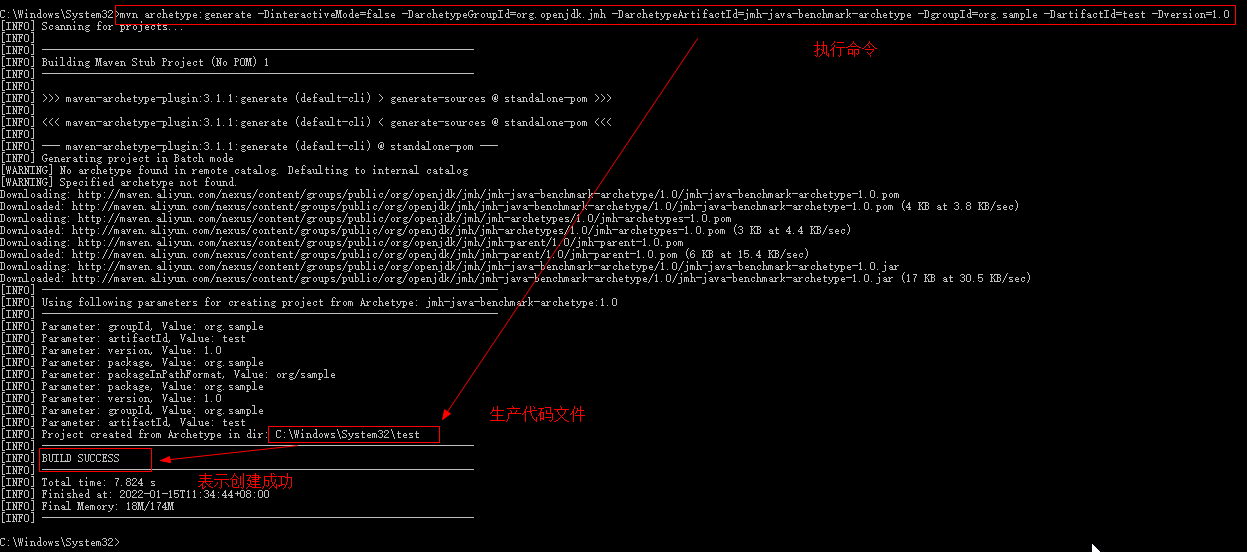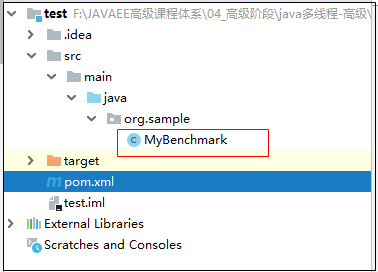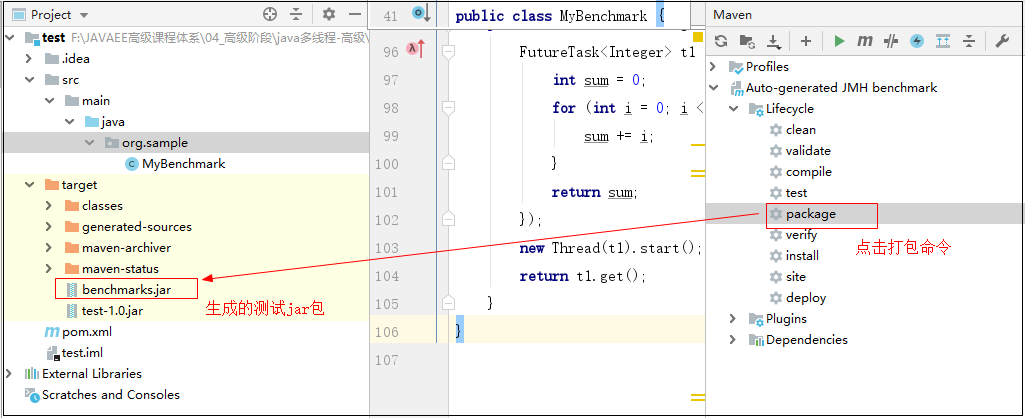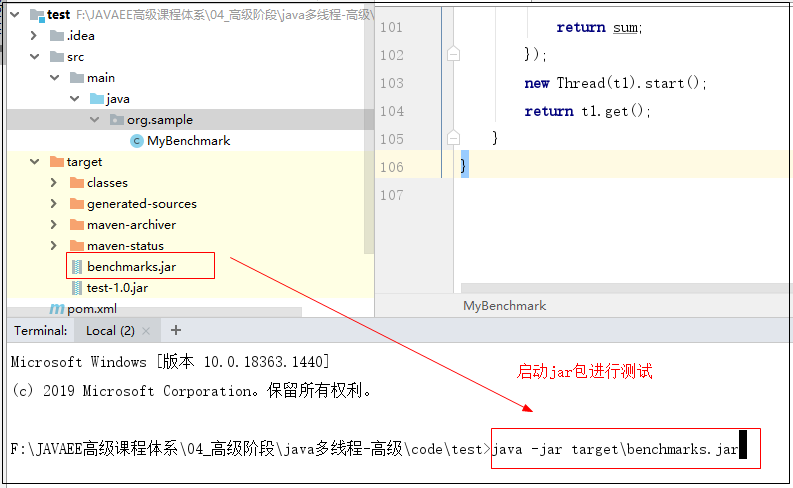1.背景
多线程性能测试
JMH:简介
JMH is a Java harness for building, running, and analysing nano/micro/milli/macro benchmarks written in Java and other languages targetting the JVM,
由简介可知,JMH不止能对Java语言做基准测试,还能对运行在JVM上的其他语言做基准测试。而且可以分析到纳秒级别。
2.生成maven工程
推荐用法通过命令行创建,构建和运行JMH基准测试。
执行如下命令:
mvn archetype:generate -DinteractiveMode=false -DarchetypeGroupId=org.openjdk.jmh -DarchetypeArtifactId=jmh-java-benchmark-archetype -DgroupId=org.sample -DartifactId=test -Dversion=1.0
特别提醒:命令不要换行

3.启动工程编写测试代码
将生成的代码使用idea打开:
注意截图中已将代码拷贝到了其他地方

编写一个1+2+3.....+10亿的测试代码
比单线程与多线程的耗时
/* * Copyright (c) 2005, 2014, Oracle and/or its affiliates. All rights reserved. * DO NOT ALTER OR REMOVE COPYRIGHT NOTICES OR THIS FILE HEADER. * * This code is free software; you can redistribute it and/or modify it * under the terms of the GNU General Public License version 2 only, as * published by the Free Software Foundation. Oracle designates this * particular file as subject to the "Classpath" exception as provided * by Oracle in the LICENSE file that accompanied this code. * * This code is distributed in the hope that it will be useful, but WITHOUT * ANY WARRANTY; without even the implied warranty of MERCHANTABILITY or * FITNESS FOR A PARTICULAR PURPOSE. See the GNU General Public License * version 2 for more details (a copy is included in the LICENSE file that * accompanied this code). * * You should have received a copy of the GNU General Public License version * 2 along with this work; if not, write to the Free Software Foundation, * Inc., 51 Franklin St, Fifth Floor, Boston, MA 02110-1301 USA. * * Please contact Oracle, 500 Oracle Parkway, Redwood Shores, CA 94065 USA * or visit www.oracle.com if you need additional information or have any * questions. */ package org.sample; import org.openjdk.jmh.annotations.*; import java.util.concurrent.FutureTask; /** * 编写一个1+2+3.....+10亿的测试代码 * <p> * 比单线程与多线程的耗时 */ @Fork(1) @BenchmarkMode(Mode.AverageTime) @Warmup(iterations = 3) @Measurement(iterations = 5) public class MyBenchmark { // 10亿 static int num = 1000_000_000; /** * 多线程计算 * * @return * @throws Exception */ @Benchmark public int testMethodMore() throws Exception { FutureTask<Integer> t1 = new FutureTask<>(() -> { int sum = 0; for (int i = 0; i < 250_000_000; i++) { sum += i; } return sum; }); FutureTask<Integer> t2 = new FutureTask<>(() -> { int sum = 0; for (int i = 250_000_000; i < 500_000_000; i++) { sum += i; } return sum; }); FutureTask<Integer> t3 = new FutureTask<>(() -> { int sum = 0; for (int i = 500_000_000; i < 750_000_000; i++) { sum += i; } return sum; }); FutureTask<Integer> t4 = new FutureTask<>(() -> { int sum = 0; for (int i = 750_000_000; i < 1000_000_000; i++) { sum += i; } return sum; }); new Thread(t1).start(); new Thread(t2).start(); new Thread(t3).start(); new Thread(t4).start(); return t1.get() + t2.get() + t3.get() + t4.get(); } /** * 普通循环计算 * * @return * @throws Exception */ @Benchmark public int testMethodSingle() throws Exception { FutureTask<Integer> t1 = new FutureTask<>(() -> { int sum = 0; for (int i = 0; i <= num; i++) { sum += i; } return sum; }); new Thread(t1).start(); return t1.get(); } }
4.打包与运行
打包:

运行jar包:

测试结果:

可以明显看到多线程比单线程快
提问:如果在单核CPU的情况下测试呢?????
这个问题很值钱,这设计到你对并发、并行、多线程等核心概念的理解
测试完整日志如下:
F:\JAVAEE高级课程体系\04_高级阶段\java多线程-高级\code\test>java -jar target\benchmarks.jar # VM invoker: D:\Program Files\Java\jre1.8.0_152\bin\java.exe # VM options: <none> # Warmup: 3 iterations, 1 s each # Measurement: 5 iterations, 1 s each # Threads: 1 thread, will synchronize iterations # Benchmark mode: Average time, time/op # Benchmark: org.sample.MyBenchmark.testMethodMore # Run progress: 0.00% complete, ETA 00:00:16 # Fork: 1 of 1 # Warmup Iteration 1: 0.130 s/op # Warmup Iteration 2: 0.120 s/op # Warmup Iteration 3: 0.115 s/op Iteration 1: 0.125 s/op Iteration 2: 0.118 s/op Iteration 3: 0.126 s/op Iteration 4: 0.114 s/op Iteration 5: 0.122 s/op Result: 0.121 ±(99.9%) 0.019 s/op [Average] Statistics: (min, avg, max) = (0.114, 0.121, 0.126), stdev = 0.005 Confidence interval (99.9%): [0.102, 0.140] # VM invoker: D:\Program Files\Java\jre1.8.0_152\bin\java.exe # VM options: <none> # Warmup: 3 iterations, 1 s each # Measurement: 5 iterations, 1 s each # Threads: 1 thread, will synchronize iterations # Benchmark mode: Average time, time/op # Benchmark: org.sample.MyBenchmark.testMethodSingle # Run progress: 50.00% complete, ETA 00:00:10 # Fork: 1 of 1 # Warmup Iteration 1: 0.405 s/op # Warmup Iteration 2: 0.381 s/op # Warmup Iteration 3: 0.390 s/op Iteration 1: 0.400 s/op Iteration 2: 0.385 s/op Iteration 3: 0.378 s/op Iteration 4: 0.379 s/op Iteration 5: 0.388 s/op Result: 0.386 ±(99.9%) 0.033 s/op [Average] Statistics: (min, avg, max) = (0.378, 0.386, 0.400), stdev = 0.009 Confidence interval (99.9%): [0.353, 0.419] # Run complete. Total time: 00:00:21 Benchmark Mode Samples Score Score error Units o.s.MyBenchmark.testMethodMore avgt 5 0.121 0.019 s/op o.s.MyBenchmark.testMethodSingle avgt 5 0.386 0.033 s/op
该博客对应的视频教程
https://www.cnblogs.com/newAndHui/p/15939255.html